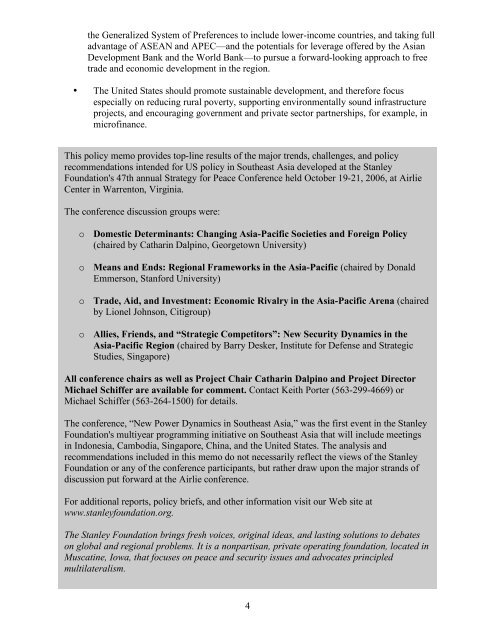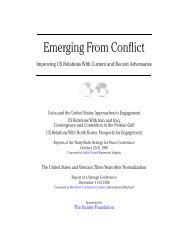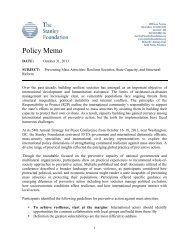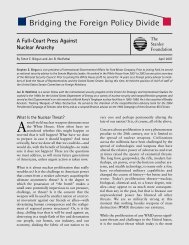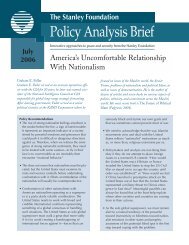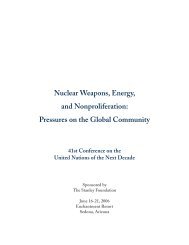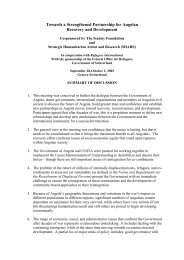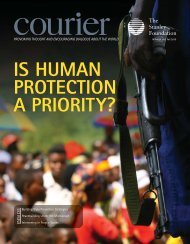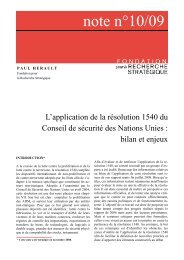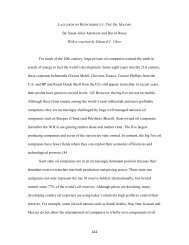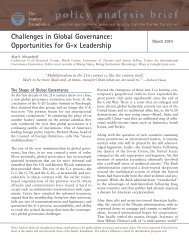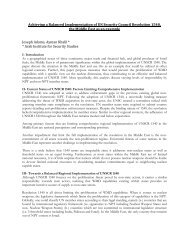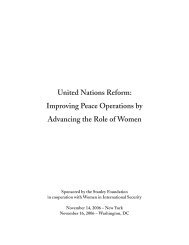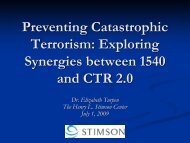Policy Memo - The Stanley Foundation
Policy Memo - The Stanley Foundation
Policy Memo - The Stanley Foundation
- No tags were found...
You also want an ePaper? Increase the reach of your titles
YUMPU automatically turns print PDFs into web optimized ePapers that Google loves.
the Generalized System of Preferences to include lower-income countries, and taking fulladvantage of ASEAN and APEC—and the potentials for leverage offered by the AsianDevelopment Bank and the World Bank—to pursue a forward-looking approach to freetrade and economic development in the region.• <strong>The</strong> United States should promote sustainable development, and therefore focusespecially on reducing rural poverty, supporting environmentally sound infrastructureprojects, and encouraging government and private sector partnerships, for example, inmicrofinance.This policy memo provides top-line results of the major trends, challenges, and policyrecommendations intended for US policy in Southeast Asia developed at the <strong>Stanley</strong><strong>Foundation</strong>'s 47th annual Strategy for Peace Conference held October 19-21, 2006, at AirlieCenter in Warrenton, Virginia.<strong>The</strong> conference discussion groups were:o Domestic Determinants: Changing Asia-Pacific Societies and Foreign <strong>Policy</strong>(chaired by Catharin Dalpino, Georgetown University)o Means and Ends: Regional Frameworks in the Asia-Pacific (chaired by DonaldEmmerson, Stanford University)o Trade, Aid, and Investment: Economic Rivalry in the Asia-Pacific Arena (chairedby Lionel Johnson, Citigroup)o Allies, Friends, and “Strategic Competitors”: New Security Dynamics in theAsia-Pacific Region (chaired by Barry Desker, Institute for Defense and StrategicStudies, Singapore)All conference chairs as well as Project Chair Catharin Dalpino and Project DirectorMichael Schiffer are available for comment. Contact Keith Porter (563-299-4669) orMichael Schiffer (563-264-1500) for details.<strong>The</strong> conference, “New Power Dynamics in Southeast Asia,” was the first event in the <strong>Stanley</strong><strong>Foundation</strong>'s multiyear programming initiative on Southeast Asia that will include meetingsin Indonesia, Cambodia, Singapore, China, and the United States. <strong>The</strong> analysis andrecommendations included in this memo do not necessarily reflect the views of the <strong>Stanley</strong><strong>Foundation</strong> or any of the conference participants, but rather draw upon the major strands ofdiscussion put forward at the Airlie conference.For additional reports, policy briefs, and other information visit our Web site atwww.stanleyfoundation.org.<strong>The</strong> <strong>Stanley</strong> <strong>Foundation</strong> brings fresh voices, original ideas, and lasting solutions to debateson global and regional problems. It is a nonpartisan, private operating foundation, located inMuscatine, Iowa, that focuses on peace and security issues and advocates principledmultilateralism.4


